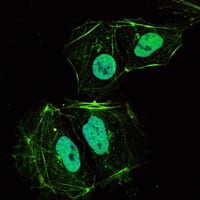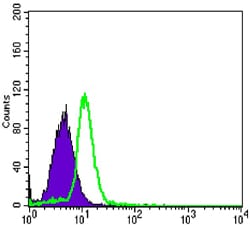

| WB | 咨询技术 | Human,Mouse,Rat |
| IF | 咨询技术 | Human,Mouse,Rat |
| IHC | 咨询技术 | Human,Mouse,Rat |
| ICC | 1/200 - 1/1000 | Human,Mouse,Rat |
| FCM | 1/200 - 1/400 | Human,Mouse,Rat |
| Elisa | 1/10000 | Human,Mouse,Rat |
| Aliases | OPG; TR1; OCIF; MGC29565; TNFRSF11B |
| Entrez GeneID | 4982 |
| clone | 5G2 |
| WB Predicted band size | 60kDa |
| Host/Isotype | Mouse IgG1 |
| Antibody Type | Primary antibody |
| Storage | Store at 4°C short term. Aliquot and store at -20°C long term. Avoid freeze/thaw cycles. |
| Species Reactivity | Human |
| Immunogen | Purified recombinant fragment of human TNFRSF11B expressed in E. Coli. |
| Formulation | Purified antibody in PBS with 0.05% sodium azide. |
+ +
1. **"Structural insights into the interaction of TNFRSF11B (OPG) with RANKL"**
*作者:Lacey DL, et al.*
摘要:该研究解析了TNFRSF11B(骨保护素,OPG)与RANKL的晶体结构,揭示了其通过抑制RANKL与RANK结合调控骨代谢的分子机制,为骨质疏松治疗策略提供依据。
2. **"TNFRSF11B polymorphisms and serum levels in postmenopausal osteoporosis"**
*作者:Khosla S, et al.*
摘要:通过分析绝经后女性群体,发现TNFRSF11B基因多态性与血清OPG水平及骨密度显著相关,提示其作为骨质疏松生物标志物的潜力。
3. **"TNFRSF11B antibody-based therapy suppresses osteoclastogenesis in rheumatoid arthritis models"**
*作者:Kong YY, et al.*
摘要:研究开发了一种靶向TNFRSF11B的单克隆抗体,在类风湿性关节炎模型中有效抑制破骨细胞分化,缓解骨侵蚀,验证了其治疗炎性骨病的可行性。
4. **"OPG/TNFRSF11B as a protective factor in vascular calcification: Role of neutralizing antibodies"**
*作者:Bucay N, et al.*
摘要:实验证明TNFRSF11B通过拮抗TRAIL信号抑制血管钙化,而特异性抗体可增强其活性,为心血管疾病治疗提供了新方向。
×